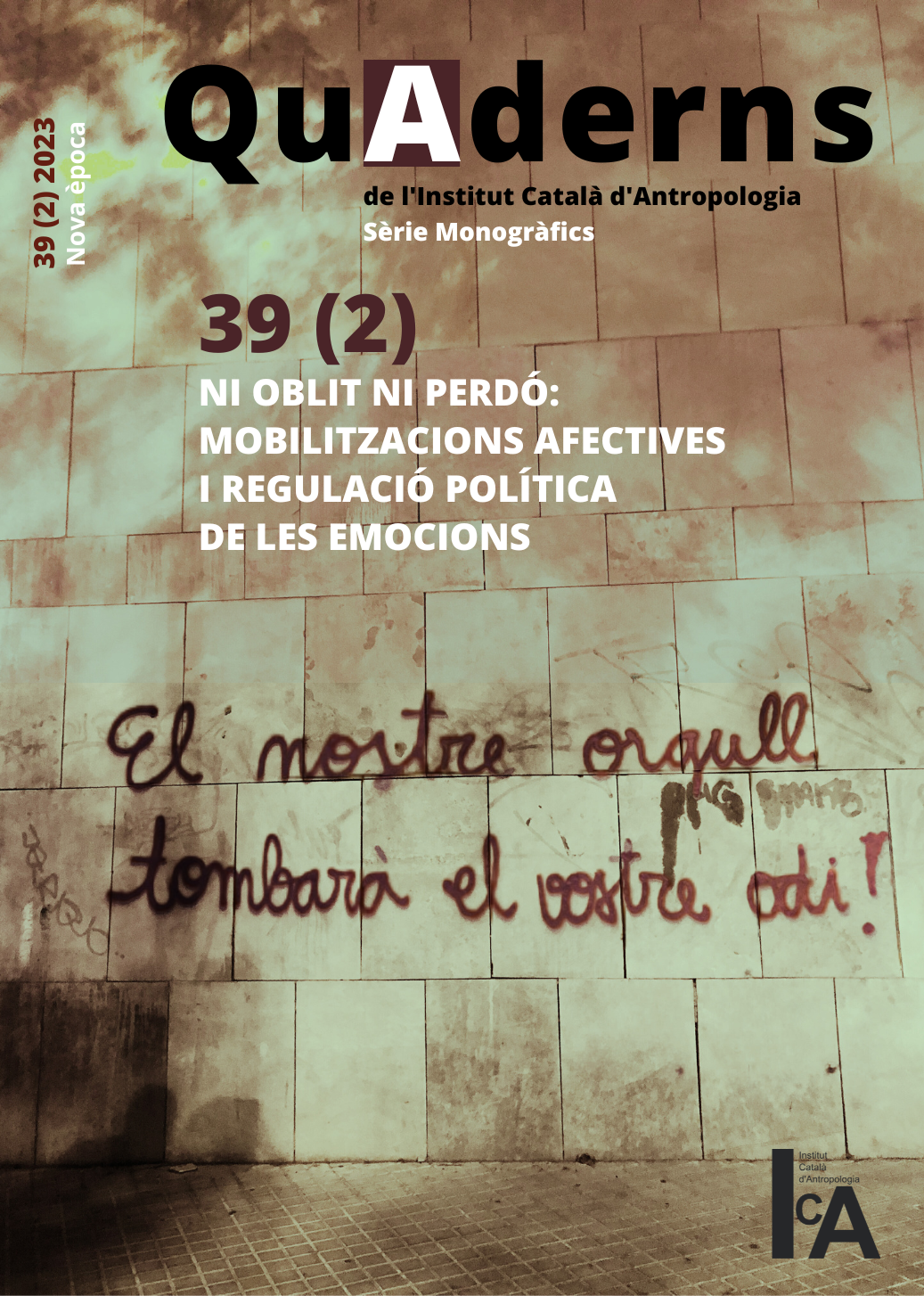Confianza y vivencia emocional de la nación en el procés independentista catalán
DOI:
https://doi.org/10.56247/qua.494Paraules clau:
Nacionalismo, emociones, confianza, sociedad civil, independentismo, CataluñaResum
El objetivo de este artículo es proponer el interés que puede tener el análisis de la noción de confianza en los estudios del nacionalismo. Se parte de una perspectiva teórica que pone el acento en la vivencia emocional de la nación y el papel de la sociedad civil en los procesos de nacionalización desde abajo. La propuesta se ejemplifica en el estudio de caso del proceso de movilizaciones que se dieron en lo que se ha el llamado Procés de reivindicación de la independencia de Cataluña, que se dio en esta región española entre 2012 y 2019. A partir del análisis etnográfico de los elementos vinculados con la celebración de la consulta o «referéndum» del 1 de octubre de 2017, el texto plantea la importancia que tuvo la confianza en todo lo relacionado con la realización de esa acción. Así como la alta carga emocional que conllevó la celebración de un acto prohibido y reprimido por parte del Estado español, que lo han convertido en un símbolo para el movimiento independentista a partir del cual se expresan y pueden comprenderse las varias emociones vívidas antes, durante y después de su celebración.
Descàrregues
Global Statistics ℹ️
|
467
Views
|
175
Downloads
|
|
642
Total
|
|
Referències
Alexander, J. C. (2004). Toward a Theory of Cultural Trauma. En Alexander, J. C., R. Eyerman, B. Giesen, N. J. Smelser y P. Sztompka (eds.), Cultural Trauma and Collective Identity (pp. 1-30). Berkeley (CA): University of California Press, DOI: https://doi.org/10.1525/california/9780520235946.003.0001
Altman, I., y Low, S. M. (1992). Place Attachment, Human Behavior and Environment. New York: Plenum Press. DOI: https://doi.org/10.1007/978-1-4684-8753-4
Barbet, P. B. (2020). Encuesta sobre polarización y convivencia en Catalunya, Informe 17/2020. Barcelona: Institut Catal Internacional per la Pau.
Baron-Cohen, S. (2011). The Science of Evil: On Empathy and the Origins of Cruelty. New York: Basic Groups.
Bayard de Volo, L. (2006). The Dynamics of Emotion and Activism: Grief, Gender, and Collective Identity in Revolutionary Nicaragua. Mobilization: An International Journal, 11(4), 461-474. DOI: https://doi.org/10.17813/maiq.11.4.q21r3432561l21t7 DOI: https://doi.org/10.17813/maiq.11.4.q21r3432561l21t7
Davies, K. (2022). Sticking Together in ‘Divided Britain’: Talking Brexit in Everyday Family Relationships. Sociology, 56(1), 97-113. https://doi.org/10.1177/00380385211011569 DOI: https://doi.org/10.1177/00380385211011569
della Porta, D. y Portos, M. (2020). A bourgeois story? The class basis of Catalan independentism. Territory, Politics, Governance, 9(3), 391-411. DOI:10.1080/21622671.2020.1737208 DOI: https://doi.org/10.1080/21622671.2020.1737208
della Porta, D., O’Connor, F. y Portos, M. (2019). Protest cycles and referendums for independence. Closed opportunities and the path of radicalization in Catalonia. Revista Internacional de Sociología 77(4):e142. DOI: https://doi.org/10.3989/ris.2019.77.4.19.005 DOI: https://doi.org/10.3989/ris.2019.77.4.19.005
Ferreira, C. (2021). Entrapped in a failing course of action: Explaining the territorial crisis in 2017. Catalonia, Regional & Federal Studies. DOI: 10.1080/13597566.2021.1907570 DOI: https://doi.org/10.1080/13597566.2021.1907570
Flam, H. (2005). Emotion’s Map: a Research Agenda. En Flam, H. y King, D. (eds.), Emotions and Social Movement (pp.19-40). Abingdon: Routledge.
Flesher Fominaya, C. (2010). Collective Identity in Social Movements: Central Concepts and Debates. Sociology Compass, 4(6), 393–404. DOI: https://doi.org/10.1111/j.1751-9020.2010.00287.x DOI: https://doi.org/10.1111/j.1751-9020.2010.00287.x
Gould, D. (2009). Moving politics: emotion and ACT UP’s fight against AIDS. Chicago, IL: University of Chicago Press. DOI: https://doi.org/10.7208/chicago/9780226305318.001.0001
Gravante, T. (2020). Forced Disappearance as a Collective Cultural Trauma in the Ayotzinapa Movement. Latin American Perspectives. 47(6), 87-102. DOI:10.1177/0094582X20951773 DOI: https://doi.org/10.1177/0094582X20951773
Gravante, T. y Poma, A. (2024). “Si mañana soy yo, si mañana no vuelvo, destrúyelo todo”: Emociones y género en mujeres activistas en México. Géneroos. Revista de investigación y divulgación sobre los estudios de género, 2(3), 88–118. DOI: https://doi.org/10.53897/RevGenEr.2024.03.03 DOI: https://doi.org/10.53897/RevGenEr.2024.03.03
Hobolt, S., Leeper, T., y Tilley, J. (2021). Divided by the Vote: Affective Polarization in the Wake of the Brexit Referendum. British Journal of Political Science, 51(4), 1476-1493. DOI:10.1017/S0007123420000125 DOI: https://doi.org/10.1017/S0007123420000125
Hochschild, A. R. (1975). The Sociology of Feeling and Emotion: Selected Possibilities. En Millman, M. y Kanter, M. (eds.), Another Voice (pp. 280–307). New York: Anchor. DOI: https://doi.org/10.1111/j.1475-682X.1975.tb00339.x
Hochschild, A. R. (1979). Emotion work, feeling rules, and social structure. American Journal of Sociology, 85, 551-575. DOI: https://doi.org/10.1086/227049
Hochschild, A. R. (1983). The Managed Heart: the Commercialization of Human Feeling: Berkeley, CA: University of California Press.
Hochschild, A. R. (2016). Stranger in Their Own Land: Anger and Mourning on the American Right. New York: New Press.
Holmes, M (2004). Feeling beyond rules: politicising the sociology of emotion and anger in feminist politics. European Journal of Social Theory, 7(2), 209-227. DOI: https://doi.org/10.1177/1368431004041752
Iyengar,S. Lelkes, Y., Levendusky, M., Malhotra, N., y Westwood, S. J. (2019). The Origins and Consequences of Affective Polarization in the United States. Annual Review of Political Science, 22, 129-146. DOI: https://doi.org/10.1146/annurev-polisci-051117-073034 DOI: https://doi.org/10.1146/annurev-polisci-051117-073034
Jasper, J. M. (1997). The Art Moral of Protest: Culture, Biography, and Creativity in Social Movements. Chicago, IL: University Chicago Press. DOI: https://doi.org/10.7208/chicago/9780226394961.001.0001
Jasper, J. M. (2011). Emotions and Social Movements: Twenty Years of Theory and Research. Annual Review of Sociology, 37, 285-303. DOI: https://doi.org/10.1146/annurev-soc-081309-150015. DOI: https://doi.org/10.1146/annurev-soc-081309-150015
Jasper, J. M. (2018). The Emotions of Protest: Chicago, IL: University of Chicago Press.
Ahmed, S. (2004). The Cultural Politics of Emotion, Edinburgh: Edinburgh University Press.
Anderson, B. (1993). Comunidades imaginadas. Reflexiones sobre el origen y la difusión del nacionalismo. México: Fondo de Cultura Económica.
Antonsich, M. & Skey, M. (2017). Affective nationalism: Issues of power, agency and method. Progress in Human Geography, 41(6), pp. 843-845. DOI: https://doi.org/10.1177/0309132516665279
Archilés, F. (2013). Lenguajes de nación. Las ‘experiencias de nación’ y los procesos de nacionalización: propuestas para un debate. Ayer, 90, pp. 91-152.
Balibar, E. & Wallerstein, I. (1991). Race, nation, class: ambiguous identities, London, New York: Verso.
Barrio, A., Barberà, O., & Rodríguez-Teruel, J. (2018). ‘Spain Steals from Us!’ The ‘Populist Drift’ of Catalan Regionalism. Comparative European Politics, 16, pp. 993–1011. DOI: https://doi.org/10.1057/s41295-018-0140-3
Billig, M. (1995). Banal Nationalism. London: SAGE. Versión en castellano: Nacionalismo banal. Madrid: Capitan Swing, 2014.
Borràs, J. (2018). Dies que duraran anys. Barcelona: Ara Llibres.
Braithwaite V. & Levi, M. (2003). Trust and Governance, New York: Russell Sage Foundation.
Broch-Due, V. & Ystanes, M. (2016). Trusting and Its Tribulations: Interdisciplinary Engagements with Intimacy, Sociality and Trust. New York: Berghahn Books. DOI: https://doi.org/10.2307/j.ctvpj7h6q
Brubaker, R. (1996). Nationalism Reframed: Nationhood and the National Question in the New Europe. Cambridge: Cambridge University Press. DOI: https://doi.org/10.1017/CBO9780511558764
Calhoun, C. (1998). Nationalism, Minneapolis: University of Minnesota Press.
Carey, M. (2017). Mistrust. An Ethnographic Theory, Chicago: HAU Books.
Closs Stephens, A. (2016). The affective atmospheres of nationalism, Cultural Geographies, 23(2), pp. 1-18. DOI: https://doi.org/10.1177/1474474015569994
Clua i Fainé, M. (2010) Democràcia i participació ciutadana: les consultes sobiranistes a Catalunya, en Cucó & Santamarina (coord.), Políticas y ciudadanía: miradas antropológicas, València: Editorial Germania, pp. 67-86.
--- (2014). Identidad y política en Catalunya: El auge del independentismo en el nacionalismo catalán actual, Quaderns de l'Institut Catala d'Antropologia, 19 (2): pp. 79-99.
--- (2015). Algunos factores explicativos del reciente auge del nacionalismo catalán: las nuevas migraciones, el discurso político de la derecha y la crisis económica, Quaderni di antropologia e scienze umane, 2 (2-3): 63-73.
Cook, K.S. (2003). Trust in Society, New York: Russell Sage Foundation.
Crameri, K. (2015). Political power and civil counterpower. The complex dynamics of the Catalan independence movement, Nationalism and Ethnic Politics, 21(1), pp. 104-120. DOI: https://doi.org/10.1080/13537113.2015.1003491
Della Porta, D., O’Connor, F., Portos, M. & Subirats Ribas, A. (2017). Social Movements and Referendums from Below: Direct Democracy in the Neoliberal Crisis, Bristol: Policy Press. DOI: https://doi.org/10.1332/policypress/9781447333418.001.0001
Eriksen, T.H. (1993). Formal and informal nationalism, Ethnic and Racial Studies, 16 (1), pp. 1-25, DOI: 10.1080/01419870.1993.9993770 DOI: https://doi.org/10.1080/01419870.1993.9993770
Flam, H. & King, D. (eds.) (2005). Emotions and Social Movements, London: Routledge.
Frijda, N. H., Manstead, A. S. R. & Bem, S. (eds.) (2000). Emotions and Beliefs: How Feelings Influence Thoughts, Cambridge: Cambridge University Press. DOI: https://doi.org/10.1017/CBO9780511659904
Geertz, C. (1990). La revolución integradora: sentimientos primordiales y política civil en los nuevos estados», en C. Geertz, La interpretación de las culturas (pp. 219-261). Madrid: Gedisa.
Giori, P. (2017). Factores de nacionalización: nacionalismo, sociedad civil y prácticas culturales. Rubrica Contemporánea, vol. VI, n. 11, pp. 95-113. DOI: https://doi.org/10.5565/rev/rubrica.132
Hochschild, A. (2016). Strangers in Their Own Land: Anger and Mourning on the American Right, New York: The New Press.
Holbraad, M. (2012). Truth in motion: The recursive anthropology of Cuban divination. Chicago: University of Chicago Press. DOI: https://doi.org/10.7208/chicago/9780226349220.001.0001
Humlebæk, C., & Hau, M.F. (2020). From National Holiday to Independence Day: Changing Perceptions of the “Diada”. Genealogy 4 (1): 31. https://doi.org/10.3390/genealogy4010031 DOI: https://doi.org/10.3390/genealogy4010031
Llobera, J.R. (2004). Foundations of National Identity: From Catalonia to Europe. New York: Berghahn Books. DOI: https://doi.org/10.1515/9781789205909
Lutz, C. & Abu-Lughod, L. (eds.) (1990). Language and the Politics of Emotion. Cambridge: Cambridge University Press.
Lutz, C. & White, G. (1986). The Anthropology of Emotions, Annual Review of Anthropology, 15:405-436. DOI: https://doi.org/10.1146/annurev.anthro.15.1.405
McCrone, D. (1998). The Sociology of nationalism: tomorrow's ancestors. London: Routledge.
Misztal B.A. (1996). Trust in Modern Societies: The Search for the Bases of Social Order, Cambridge: Polity Press.
Möllering G. (2001). The nature of trust: From Georg Simmel to a theory of expectation, interpretation and suspension. Sociology, 35(2), pp. 403-420. DOI: https://doi.org/10.1017/S0038038501000190
Palmer, C. (1998). From Theory to Practice. Experiencing the nation in everyday life. Journal of Material Culture, 3(2), pp. 175-199. DOI: https://doi.org/10.1177/135918359800300203
Sallés, Q. (2018). On eres l’1-0? De l’orgull a la indignació. Barcelona: Rosa dels vents.
Seligman, A. (1997). The Problem of Trust, Princeton: Princeton University Press.
--- (1998). Trust and Sociability: On the Limits of Confidence and Role Expectations. The American Journal of Economics and Sociology, 57(4), pp. 391-404. DOI: https://doi.org/10.1111/j.1536-7150.1998.tb03372.x
Tedó, X. & Vicens, L. (2017). Operació Urnes. Barcelona: Columna editorial.
Wetherell, M. (2014). Affect and banal nationalism: A practical dialogic approach to emotion. En: C. Antaki i S. Condor (eds.), Rhetoric, Ideology and Social Psychology: Essays in Honour of Michael Billig (pp. 137-150). London: Routledge.
Descàrregues
Publicades
Com citar
Número
Secció
Llicència
(CC BY-NC-SA 4.0)




